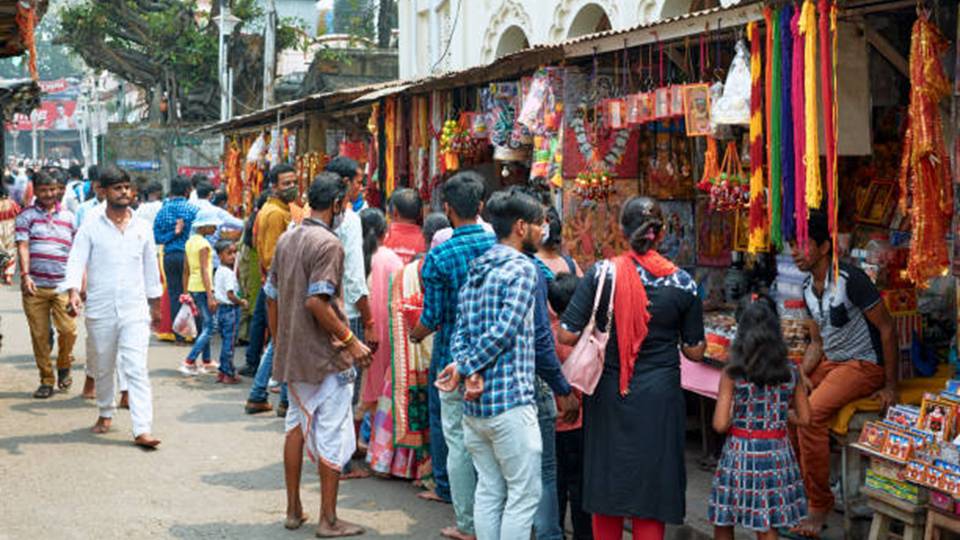Multinational restaurant and food chains are now eyeing places of worship such as the Golden Temple, Vaishno Devi, Tirupati and Shirdi. Want to know, why? Well, Burger King, McDonald’s, Domino’s, Burger Singh, Subway, and ChaiPoint want to set up stores at Hindu teerath sites. The outlets would offer 100% vegetarian food with no onion and garlic at these locations.
But the question here is why they have chosen to open their stores in these pilgrim sites? I’ll tell you why. These sites offer a ready to capture market and lack competition—factors, which are what these branded food-chains seek for setting up new stores.
Now, let’s decode the economics of Hindu Teerath sites and why they are the best suitable place for economy and business.
Temple towns are economic hub
You see, temples are not only central to society but economy as well. A temple is a big unit and it requires various people including priests, cooks to cook prasad, singers, dancers, attendants among others to function. Since it would be very time-consuming for them to commute on a daily basis, they start settling near the temple.
More the number of people situated near temples, more the number businesses and small scale trades to run their families. This is what leads to the setting up of multiple shops near temples and simply converts the area into an economic hub.
Also read: 1000 ASI protected temples will be reopened for worship
Promotion of small scale business
Towns around temples promote small scale business. It includes handicrafts, ornaments, jewellery, etc. These businesses are set up by people near temples to attract more visitors so that they can earn their living. These artists and sculptors settle near the temples to sell their art and products to the people coming from far off places. As a consequence, they earn good revenues.
While we discussed only the handcraft material here, it needs to be mentioned that there’s much more to the economics of Hindu teerath sites.
If you’ve ever been to Vaishno Devi, you must have discovered that the route is dotted with shops. While some shops offer prasad, others have snacks to offer you to make your journey even more memorable.
From flowers to agarbatti, idols to posters of god, people have opened small shops to sell mementos. Moreover, some of the people have also opened their chai ki tapri, maggi shops and pakora shops.
The ancient city’s centuries-old sites are giving way to glitzy luxury hotels, and small scale hotels too. You see, these hotels are hardly vacant and unoccupied as the number of pilgrims keeps increasing by the end of the year.
Also read: The Sita Janmabhoomi temple in Bihar will finally be restored to its ancient glory
How does it help the economy
Simply put, places of worship are a major attraction for food stalls, small scale trade of handicraft, hotels and other stuff.
Let us imagine a case where if someone set up a pakode stall in a place of pilgrimage. How much investment would be noted in total? Around 3000 to 4000 rupees. And the profit it makes is hundred times of what was spent.
The NSSO survey estimates that “the temple economy is worth Rs 3.02 lakh crore or about $40 billion and 2.32 per cent of GDP.” It includes everything from flowers, oil, lamps, perfumes, bangles, sindur, images and puja dresses.
Ram Mandir movement and the court verdict have completely changed the game. Because of this movement, the region that was one of the most backward has received huge funding.
The NSSO figures also suggest that “55 per cent of Hindus undertake religious pilgrimages patronizing mid and small sized hotels.” It further informs that “Expenses on religious travel are Rs 2,717 per day/person, expenses on social travel, Rs 1,068 per day/person, expenditure on educational travel, Rs 2,286 per day/person. That comes to expenditure on religious travel of Rs 1316 crore per day and an annual expenditure on religious travel of Rs 4.74 lakh crore.”
The temple towns have also begun contributing in the nation’s GDP. The Hindu teerath sites are not only beneficial in terms of spirituality but economy too.
Support TFI:
Support us to strengthen the ‘Right’ ideology of cultural nationalism by purchasing the best quality garments from TFI-STORE.COM
